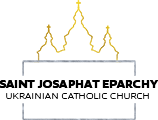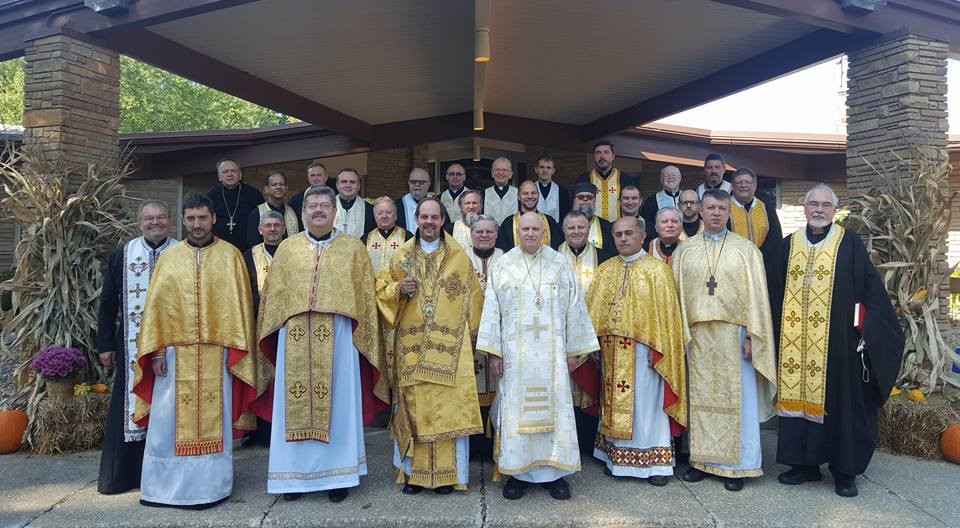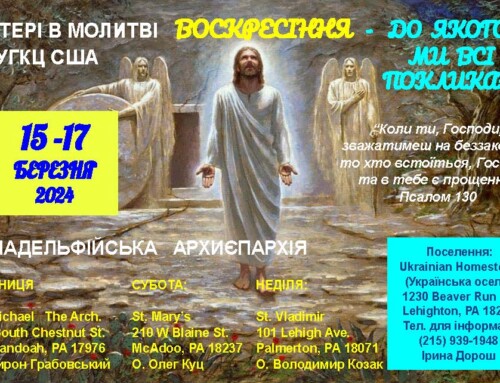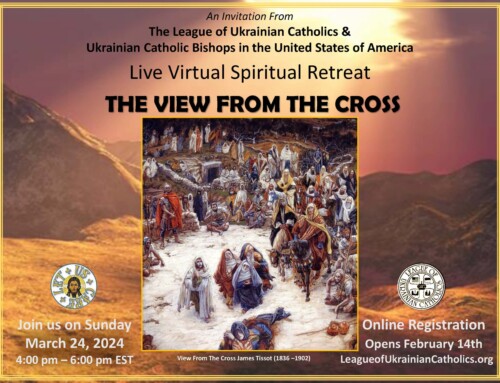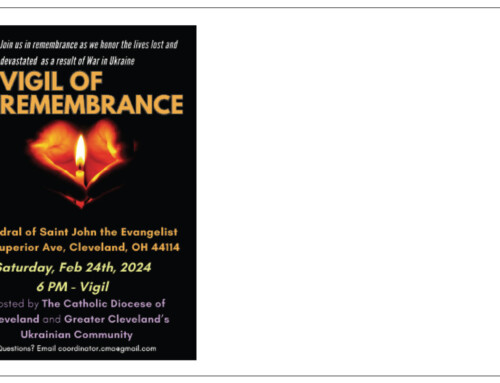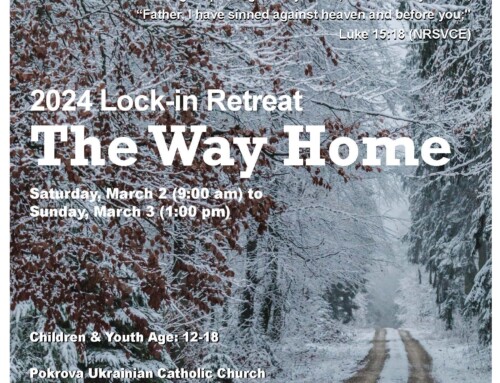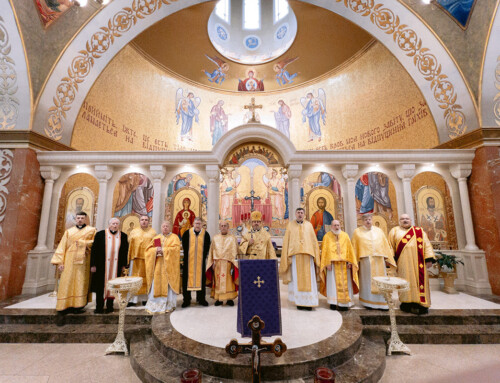The clergy of the Ukrainian Catholic Eparchy of St. Josaphat in Parma held their annual retreat October 4-7, 2016 at the Loyola Retreat Center in Clinton, Ohio.
The retreat was led this year by Bishop Kurt Burnette, Eparch of the Byzantine Catholic Eparchy of Passaic (New Jersey). After Bishop Bohdan Danylo, Eparch of the Ukrainian Catholic Eparchy of St. Josaphat in Parma, introduced Bishop Kurt to the retreatants, the retreat master commenced his first spiritual conference. He began by talking about beauty. He said that the beauty of the world around us can lead us to behold the beauty of God Himself. As Psalm 19 says, “The heavens are telling the glory of God; and the firmament proclaims His handiwork” (19:1). Yet, “the most beautiful thing in the world is you,” said the hierarch, addressing the retreat’s participants. Having been created in God’s image and likeness, man supersedes any creature fashioned by God and, although man lost the likeness of God due to the original sin, the image of God always remains in him. Moreover, Bishop Kurt implied that God’s likeness in man could be renewed through the Holy Mysteries of Baptism and Reconciliation. The hierarch continued by saying that man is the most dignified being among the Lord’s creatures – even higher than the Angels. Man can also know and understand – a feature unique to the creatures with the intellect – that gives man an ability to appreciate beauty. One of the most distinctive features of man though is his ability to take part in God’s creative power through the gift of procreation of offspring: the power to create immortal beings that possess the Lord’s image and likeness. Bishop Kurt concluded his first conference by saying that if man truly knew how beautiful he was, he would never commit even a smallest sin.
During his second conference, Bishop Kurt centered around the destructive power of sin and the beauty of avoiding it. After sin entered the world, God already had a plan to liberate man from sin by sending His Son Jesus Christ down to earth. Christ became man, because man is made in God’s image and likeness. Jesus was the promised Messiah, although not every Jew accepted Him as such. The hierarch continued by saying that in today’s world, the sins of the flesh are widespread. All of these sins, just like every other sin, rupture and put down man’s self-esteem and the only person, who can liberate man from sin, is God, Who does it through His Good News. This Good News – the Gospel of Jesus Christ – ought to be preached and presented to people in a positive light, otherwise, if it is presented in a negative way, it can turn people away from the Lord and His Holy Church.
The retreat master commenced his third conference by continuing to talk about the destructive power of sin. He said that “sin is irrational” and it can destroy man’s original beauty. Bishop Kurt stated that while generally speaking satan’s sin of pride is considered the root of all evil, the sin of envy on the part of satan has more grounds to be considered the origin of all evil. Satan envied God Himself and then, after the Lord created man in His own image and likeness, the devil envied man and set out to destroy him. “It
Continuing where he left off, Bishop Kurt started the fourth conference by saying that “satan is out to destroy relationships and family.” Quoting one person, the bishop said: “The devil works tirelessly to destroy families.” When tempting us to sin, satan first makes us proud and then he accuses us, he makes us ashamed. The word ‘diabolos’ means ‘accuser,’ ‘slanderer,’ also ‘divider.’ However, sin does not have the last word. The Lord gave us His grace to overcome sin and although grace is given to man freely, it concomitantly costs. The retreat master went on to say that man has good urges that God gave him for a good reason. These urges are: self-preservation, urge to fit into society and urge to have a mate. At the end of the conference, Bishop Kurt said that man deals with three basic negative emotions: anger, shame and fear. Anger indicates in man that something is wrong with the society. Shame points in man that something is wrong with him. Fear says that man’s safety is threatened. However, the fear of the Lord is not something negative or sinful, but virtuous. Yet, love is above everything, for “love does not remember injuries” and does not hold grudges. “The basic cure for our problems is to trust God,” said the hierarch. The Lord takes care of all our needs, if we entrust ourselves to Him.
Retreat master centered his fifth conference on seven deadly sins (also known as capital vices or cardinal sins) and the symptoms of sinful pride. Bishop Kurt stated that during the early development of seven deadly sins, the Church Fathers had a very sophisticated system in this regard. They particularly talked about spiritual states of acadia and atonia. Acadia is basically a spiritual carelessness while atonia is the relaxation of the soul or it could also be called the ‘weakening of the soul’s muscles.’ Remedy for acadia is work and for atonia – ‘strengthening of the soul’s muscles.’ The hierarch also said that pride is different from bragging. According to the bishop, “healthy pride is the truth [while] sinful pride is a lie.” By the same token, “healthy humility is the truth [while] false humility is a lie,” stated the retreat master. He went on by saying that the problem with pride, as opposed to other sins, is that one can’t see it in himself. Bishop Kurt concluded the conference by listing the symptoms of sinful pride, the deadliest of which are self-pity, not listening [to others], blaming others, isolation and lying. All of these symptoms of sinful pride could be cured by virtuous life with the help of the Lord’s grace.
Retreat participants also took part in bi-lingual celebrations of the Divine Liturgy and other liturgical services as well as had an opportunity for confession and spiritual talks with the retreat master. Likewise, during the retreat, Right Reverend Archimandrite George Appleyard, Protosyncellus of the Ukrainian Catholic Eparchy of St. Josaphat in Parma, on behalf of all the clergy, congratulated Bishop Bohdan Danylo on the occasion of his 20th priestly anniversary and wished him Lord’s abundant blessings that was accompanied by the singing of the traditional “Many years!” and the bishop’s blessing.
At the end of the spiritual exercises, Bishop Bohdan thanked Bishop Kurt on behalf of the entire clergy for having shared his word of wisdom with the retreat participants and wished him God’s choicest blessings in his episcopal ministry.
В Єпархії святого Йосафата в Пармі відбулися реколекції для духовенства
4-7 жовтня 2016 року в реколекційному центрі «Лойола» міста Клінтон, штат Огайо, відбулися щорічні реколекції для духовенства Єпархії святого Йосафата в Пармі УГКЦ.
Реколекції цього року проводив владика Курт (Бернетт), єпарх Візантійської греко-католицької єпархії Пассеїка (штат Нью-Джерсі). Після того, як владика Богдан (Данило), правлячий архиєрей Єпархії святого Йосафата в Пармі УГКЦ, представив духовенству владику Курта, реколектант розпочав свою першу духовну науку, зосередившись на темі краси. Він зазначив, що краса оточуючого нас світу може привести нас до споглядання краси Самого Бога. Як каже Псалом 19, «Небо звіщає про Божу славу, а про чин Його рук розказує небозвід» (19,1). Проте, «найкрасивішою річчю у світі є Ви», сказав єрарх, звертаючись до учасників реколекцій. Будучи створеною на образ і подобу Божу, людина перевершує будь-яке створіння, сотворене Богом і, хоча людина втратила подобу Божу через первородний гріх, образ Божий завжди перебуває в ній. Більше того, владика Курт мав на увазі, що образ Божий в людині може бути відновлений через Святі Тайни Хрищення та Покаяння. Продовжуючи, єрарх зазначив, що людина є найдостойнішим буттям серед Господніх створінь – вищим за Ангелів. Людина також здатна знати і розуміти, що є особливістю, унікальною для розумних створінь, що надає людині здатність цінувати красу. Проте, однією з найбільш відмінних рис людини є її здатність брати участь у творчій силі Божій через дар дітонародження: здатність творити безсмертних осіб, які мають образ і подобу Божу.
Владика Курт закінчив свою першу конференцію, підкресливши, що якщо б людина дійсно знала, яка вона прекрасна, вона ніколи не вчинила б навіть найменшого гріха.
Під час своєї другої конференції владика Курт зосередився довкола руйнівної сили гріха та краси його уникнення. Після того як гріх увійшов у світ, у Бога вже був план, щоб звільнити людину від гріха, пославши Свого Сина Ісуса Христа на землю. Христос став людиною, бо людина створена на образ і подобу Божу. Ісус був Месією, хоча не кожен єврей прийняв Його як такого. Єрарх продовжив, кажучи, що у сучасному світі дуже поширені гріхи плоті. Всі ці гріхи, так само як і будь-який інший гріх, ранить та придушує в людини почуття власної гідності і єдиною особою, яка може звільнити людину від гріха, є Бог, Який робить це завдяки Своїй Благовісті. Ця Благовість, яка є Євангелієм Ісуса Христа, повинна бути проповідувана і представлена людям в позитивному світлі, бо в іншому випадку, якщо вона представлена негативним способом, вона може відвернути людей від Господа Бога та Його Святої Церкви.
Реколектант розпочав свою третю конференцію, продовжуючи говорити про руйнівну силу гріха. Він сказав, що «гріх є ірраціональним» та може руйнувати первісну красу людини. Владика Курт зазначив, що в той час як, загалом кажучи, гріх гордості злого духа вважається коренем всього зла, гріх заздрості з боку сатани має більше підстав вважатися походження зла. Диявол позаздрив самому Богові, а потім, після того, як Господь створив людину на Свій образ і подобу, сатана позаздрив людині і поставив собі за мету знищити її. «Це [заздрість] найгірший гріх», сказав єрарх. Реколектант рівно ж згадав історію Вибраного Народу в Старому Завіті і порівняв християнське і єврейське розуміння Святого Письма, які мають певні відмінності. Одним із спільних елементів між християнським і єврейським розумінням Святого Письма є той факт, що, якщо людина виконує заповіді Божі, вона буде благословенна; якщо ні, то вона принесе на себе покарання/прокляття. Проте, понад усе, Бог є любов. І хоча, незважаючи на величезну доброту Бога, в світі ще існує зло, воно існує не тому, що Бог недосконалий або Йому чогось не вистачає, але тому, що Господь Бог обдарував людину вільною волею, щоб вона могла вибирати між добром і злом.
Продовжуючи, де він зупинився попереднього разу, владика Курт розпочав свою четверту науку, кажучи, що «сатана завжди шукає нагоди руйнувати відносини та родину». Цитуючи одну особу, архиєрей сказав: «Диявол працює невпинно, щоб зруйнувати родину». Спокушаючи нас до гріха, злий дух спочатку робить нас гордими у вчиненому грісі, а потім звинувачує та змушує нас соромитися. Слово ‘diabolos’ означає ‘обвинувач’ ‘наклепник’ як також ‘той, хто розділяє’. Тим не менше, за гріхом не останнє слово. Господь дав нам Свою благодать, щоб подолати гріх і хоча благодать дана людині вільно, вона одночасно коштує. Реколектант продовжив свою духовну науку кажучи, що людина володіє хорошими спонуканнями, які Бог дав їй з доброго наміру. Цими спонуканнями є: самозбереження, прагнення бути частиною суспільства та бажання мати подруга життя. Наприкінці конференції, владика Курт зазначив, що людина стикається з трьома основними негативними емоціями: гнівом, соромом і страхом. Гнів збуджує в людині думки та почуття, що щось не так із суспільством. Сором впливає на мислення людини, що щось не так з нею. Страх каже людині, що її безпека під загрозою. Страх Господній, натомість, не є чимось негативним або гріховним, але доброчесним. Проте, любов понад усе, тому що «любов не пам’ятає травм» і не тримає образ. «Основними ліками від наших проблем – це довіра Богові», зазначив єрарх. Господь дбає про всі наші потреби, якщо ми довіряємо себе Йому.
Реколектант зосередив свою п’яту конференцію на темі семи смертних гріхів (також знаних як головних гріхів) та симптомах гріховної гордості. Владика Курт зазначив, що під час раннього розвитку семи смертних гріхів, Отці Церкви мали дуже складну систему в цьому відношенні. Зокрема, вони говорили про такі духовні стани знані як акадія та атонія. Акадія – це в основному духовна недбалість в той час як атонія – це ослаблення душі або її також можна назвати ‘пом’якшенням духовних м’язів’. Засіб оздоровлення від акадії – це праця, а для атонії – ‘зміцнення духовних м’язів’. Єрарх також сказав, що гордість відрізняється від хвастощів. За словами єпископа, «здорова гордість – це істина [в той час як] гріховна гордість – це неправда». Таким самим чином, «здорове смирення – це істина [в той час як] помилкове смирення – це неправда», зазначив реколектант. Він продовжив, зазначивши, що проблема з гордістю, на відміну від інших гріхів, є те, що людина не може бачить її [гордості] в собі. Владика Курт завершив свою духовну науку перерахуванням симптомів гріховної гордості, найсмертоноснішими з яких є жалість до себе, не вислуховування інших, звинувачення інших, ізоляція та брехливість. Всі ці симптоми гріховної гордості можна вилікувати доброчесним життям за допомогою Господньої ласки.
Учасники реколекцій також брали участь в двомовних богослужіннях як також мали нагоду для сповіді та духовних розмов з реколектантом. Крім того, під час реколекцій, преподобний отець-архимандрит Джордж Еппл’ярд, Протосинкел Єпархії святого Йосафата в Пармі УГКЦ, від імені всього духовенства, привітав владику Богдана (Данила) з нагоди його 20-літнього ювілею священства і побажав йому найрясніших Господніх благословень, що супроводилося традиційним співом многоліття та архиєрейським благословенням.
На завершення духовних наук, владика Богдан подякував владиці Курту від імені всього духовенства за те, що він поділився своїм словом мудрості з учасниками реколекцій та побажав йому найобильніших Божих благодатей у його єпископському служінні.
